Marina Sirtis on Hollywood, Gender Politics, Ageism & the Ultimate Doctor Who
by Evelyn Reid
Originally published on About.com September 9, 2014
One of the most recognizable faces not only in the world of sci-fi but across ’80s and ’90s syndicated television, Marina Sirtis’ iconic role as Star Trek: The Next Generation Counselor Deanna Troi fueled more than a few passing fantasies. But skin-tight space suits and glorious hair aside, there’s more than meets the eye to Sirtis. Way more. I almost pity the fool who expects the English actress to be the low-key, zen-like embodiment of her on-screen alter ego. Just a few minutes with Sirtis reveals the polar opposite: sparks, fire, buoyant laughter, and a confident, unabashed, in-your-face sense of self.
In an interview I conducted with Sirtis prior to her 2014 Montreal Comiccon appearance along with almost the entire cast of TNG (Wil Wheaton couldn’t make it), she spares no words in her observations of Hollywood’s limitations. For the sake of argument, some may say those limitations may be a contributing factor to Hollywood’s current decline. With all this in mind, Sirtis offers valuable advice to viewers fed up with what they’re seeing on the screen, be it on television or in the movies.
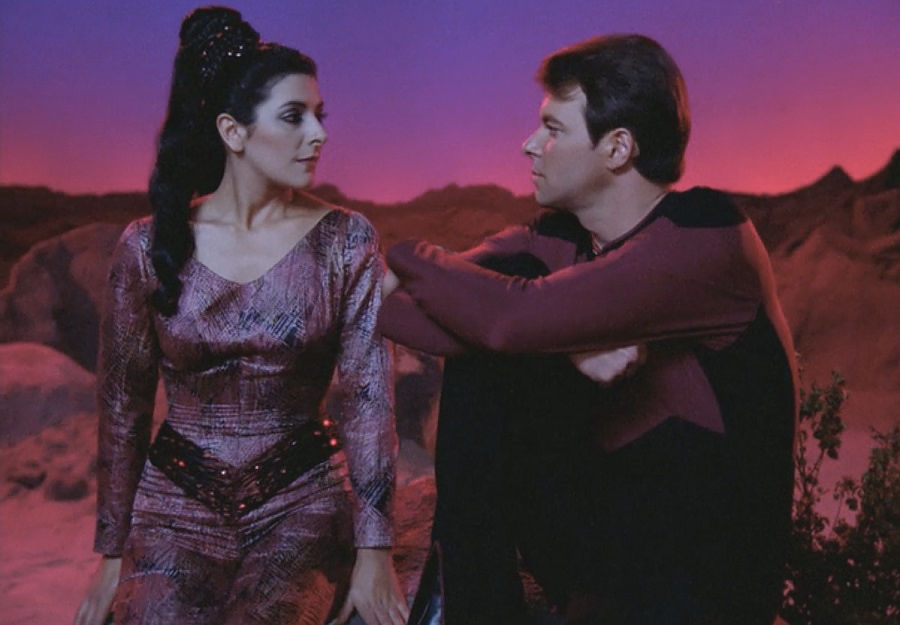
Above: Star Trek: The Next Generation’s Counselor Troi (Marina Sirtis) with Commander Riker (Jonathan Frakes) (photos courtesy of Paramount Pictures).
Evelyn Reid: Hi Marina! I just finished chatting with your imzadi. He says hi and gives his love.
Marina Sirtis: Ohhh, where is Jonathan?
Evelyn Reid: I’m not sure.
Marina Sirtis: He might already be up [in Canada]. He does a lot of directing work in your country.
Evelyn Reid: Does he? Interesting that you brought up his directing because I was just talking about that with him, specifically over what you said. I had quoted you from a 2012 conference. You were saying that in the 36 years of your career, Jonathan Frakes was the best director you had ever worked with.
Marina Sirtis: And it’s true.
Evelyn Reid: How come? What is it about Jonathan’s style that’s so praiseworthy?
Marina Sirtis: Well, directors—and I’m generalizing madly here, you have to understand—directors tend to fall in one of two categories. There are directors that the actors love. And there are directors that the crew loves. The love is for different reasons. The [directors] actors love understand your process, your work, what you’re going through. If they’re an actor themselves, then they have good suggestions to make, they listen… all the things you want from a director as an actor. The directors [crews] love know what they’re doing [on set], [the crew doesn’t] have to work ridiculous hours. Well, the hours are ridiculous anyway but at least you don’t have to work extra ridiculous hours. You’ve got some people who show up to work and they don’t know what they’re going to shoot that day. They kind of wing it. But Jonathan? He has a plan, he has an agenda, he knows which shots he wants, he knows exactly what he wants. [The crew] loves him because he knows what he’s doing.
“It’s very rare that you’ll go onto a film set or a TV set and everyone on the set loves the director. I mean, they would walk on glass for Jonathan. And there’s his personality. He’s a force of nature.”
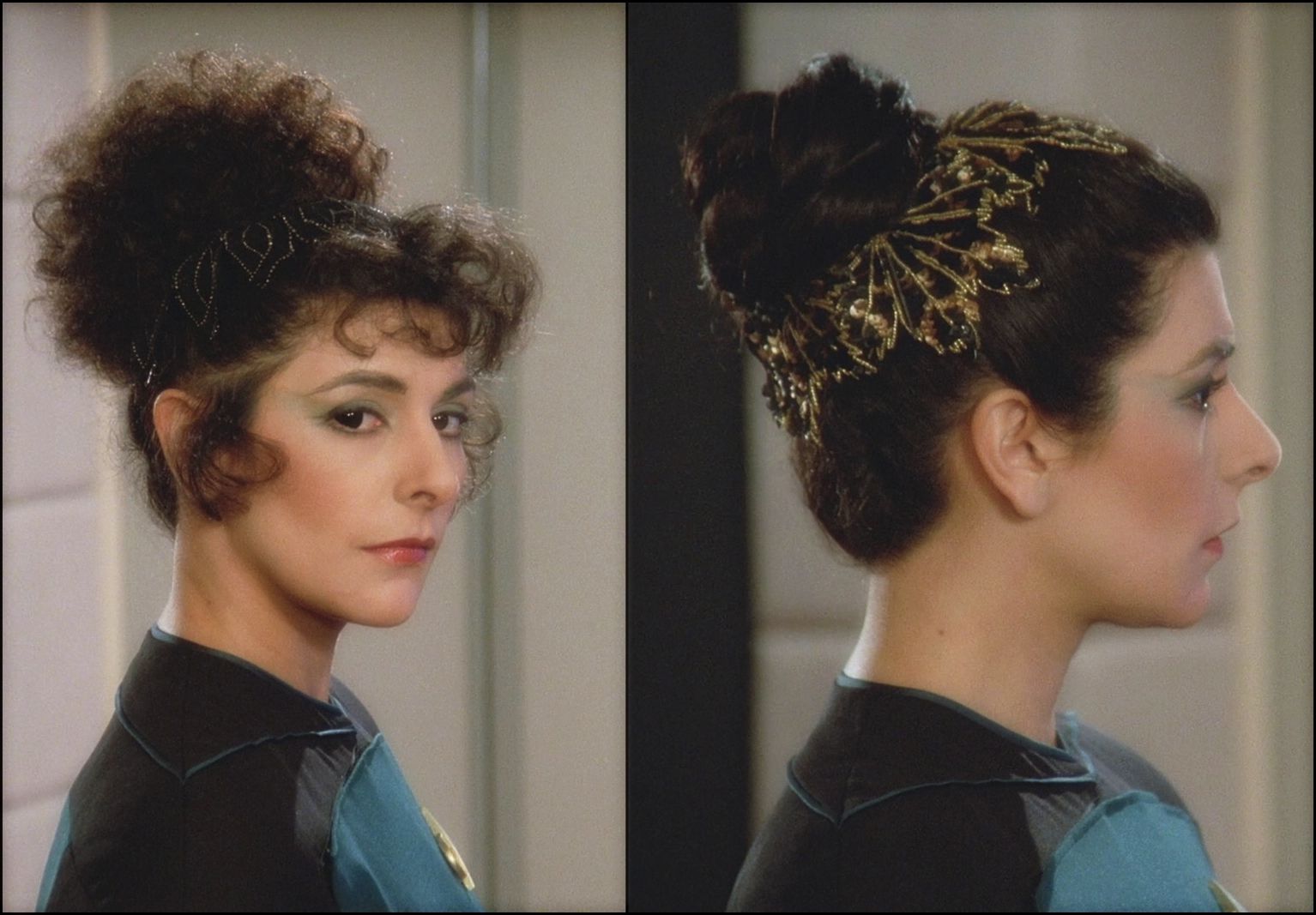
Above: Marina Sirtis doing hair and makeup screen tests prior to Star Trek: The Next Generation’s 1987 pilot.
Evelyn Reid: Right.
Marina Sirtis: It’s very rare that you’ll go onto a film set or a TV set and everyone on the set loves the director. I mean, they would walk on glass for Jonathan. And there’s his personality. He’s a force of nature.
Evelyn Reid: That’s what I’ve heard, that’s he’s almost like the glue that keeps the team together in a way.
Marina Sirtis: No, I’m the glue.
Evelyn Reid: You’re the glue.
Marina Sirtis: I’m the glue. He’s like the energy. He’s like this… I remember the first time I ever met him. He came into the makeup trailer and it was like a hurricane blew in. He really is like this larger-than-life person.
Evelyn Reid: He must have powerful chi. [Laughter].
Marina Sirtis: Oh, he’s wonderful. But as far as keeping everyone together, that would be me. I’m the one who cooks and invites and made sure everyone had lunch on their plates. I was the Mother Hen.
Evelyn Reid: The Mother Hen of the Enterprise. A far cry from the mastermind Troi was supposed to be.
Marina Sirtis: That’s right. I was supposed to be the brains…
Evelyn Reid: …which makes complete sense. I used to wonder as a kid why you didn’t have more authority on the ship. You’re an empath. You can read other people’s emotions. That’s a powerful weapon. Or diplomatic tool. Picard should have been consulting you at every turn the moment a humanoid was involved.
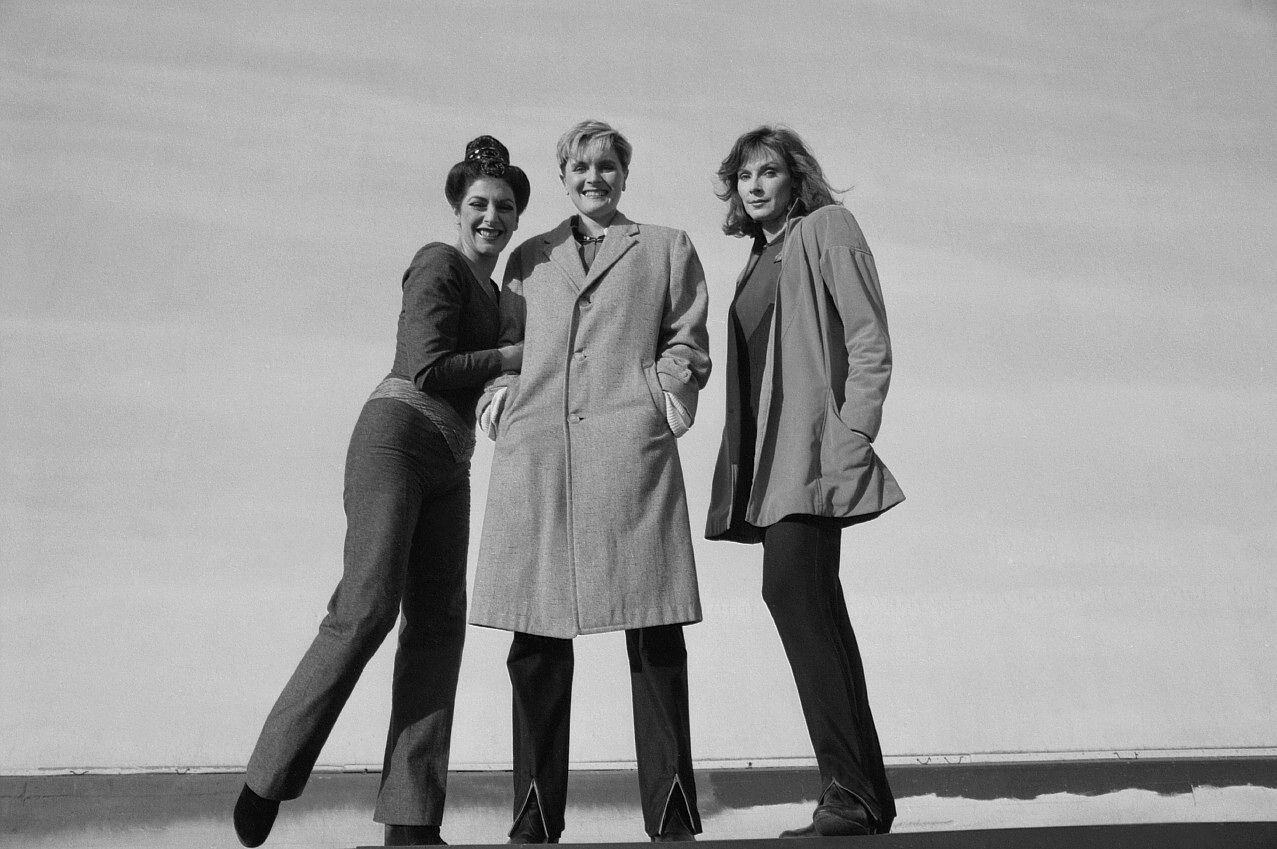
Above from left to right: Star Trek: The Next Generation cast members Marina Sirtis, Denis Crosby, and Gates McFadden.
Marina Sirtis: It’s true. She is technically the smartest person in the room. But that didn’t work for a lot of the stories. And I’ve said this a lot and I hate myself for saying it but I think it’s needs to be said because sci-fi fans need to get it into their heads that yes, we’re making shows about the future. But the shows are not written by writers from the future. It’s the writers of today, with all their foibles and ideas and bigotries and histories and baggage. You have to remember that. These shows aren’t being written in the 24th century. The Next Generation was being written in the 20th century. And by men, generally.
Evelyn Reid: Right. In fact, I think there was only one female writer on the team? Or was that with the original Star Trek series?
Marina Sirtis: We had two. Jeri Taylor was a writer/producer on our show for many years. And [while we’re on the topic of writers], Michael Piller wrote me some wonderful stuff. Absolutely did. But this problem doesn’t just [apply] to Star Trek. This is a problem with all sci-fi.
Evelyn Reid: Add all North American television in there, in general, barring rare exceptions. You know, I was just thinking about that whole issue in the context of TNG. Again, even as a kid, it seemed like something was off with the women on the show in the sense of, what happened to Denise Crosby? Where did she go? In the first episodes, she was fascinating but as the show went on, her character seemed to become trivial. And why was Gates McFadden suddenly off the show? And what’s up with the wig when she got back? Her hair was fine before. It seemed like there was this unbalance with regards to the female characters or possibly even treatment on the set. And we haven’t even gotten into Troi’s costumes yet.
Marina Sirtis: Well, Denise quit. It’s as simple as that. Denise wasn’t happy doing a TV series and she quit. But you know, they were really nice because she had a contract. They could have been a-holes and held her to her contract, which has happened in the past in show business. Especially because she was so popular.
Evelyn Reid: She was huge.
Marina Sirtis: She was huge! Her and Data were the two most popular characters by far on the show in the beginning when we first started the show. But Gene [Roddenberry] didn’t want anyone on the show who wasn’t happy. She wanted to leave and he said, “go love. Good luck!” As for Gates, that was a different thing, you’d have to talk to her.
“Something you have to understand about Hollywood and I’m not joking here: Hollywood is all about the hair.”
Marina Sirtis: She was let go. But they realized they made a terrible mistake and they brought her back. You know, it’s difficult for women in this business. But we’re talking about the ’80s now, the late ’80s, early ’90s. This was a long time ago. Things have changed a lot since then, thank goodness.
Evelyn Reid: [Sigh]
Marina Sirtis: Something you have to understand about Hollywood and I’m not joking here: Hollywood is all about the hair.
Evelyn Reid: [Laughter]
Marina Sirtis: Hollywood is all about the hair. This is why you never see anyone with a hair out of place on TV. Ever. Like GOD FORBID there should be one hair sticking out. That’s it. I don’t know why they focus on the hair. But they do. In seven years on TNG, the only notes I ever got apart from the “omg you’re brilliant” notes of which I’m like yeah, yeah, I get it… the only time I ever got a note or a phone call was for things like “um, have you changed the color of your lipstick?” Or “did you do something to the front of your hair? It doesn’t look the same.” I mean, literally. This is what they obsess over. How you look.
Evelyn Reid: But do you really see the same thing across the pond?
Marina Sirtis: I always say, in England, it actually goes against you to look good.
Evelyn Reid: Geez.
Marina Sirtis: Actually, in England, the worse you look, the better. I always say that when I come back in my next lifetime, I want to come back fat and Northern and [that way], I will never stop working in [England].
Evelyn Reid: You know, I was watching this film a couple of weeks back. It’s called The Hairdresser. It’s German and I think it came out in 2010. Its star character is, first of all, a woman, she’s obese, she’s middle-aged, she can still move her face so it’s obvious she doesn’t have much botox, and GASP, she has a sex life. An explicit one. And guess what? The film was great!
Marina Sirtis: The film was brilliant, right?
Evelyn Reid: It was wonderful. But you just don’t see that here in North America, in Hollywood or even in general. So on the one hand, as you said before, a lot has changed since the ’80s but on the other hand, there’s the argument that we may actually be regressing in terms of how we portray women on the big screen and on the small screen.
Marina Sirtis: I do. I am one of those people who thinks we’re regressing.
Evelyn Reid: And as a woman myself, I already felt disenfranchised by Hollywood by the time I hit age 25 because it seemed as though television and movies were telling me that my life was over, that my best years were gone. I’m done. I’m over. I’m a walking, breathing decline from there.
Marina Sirtis: Well honey, you try being my age.
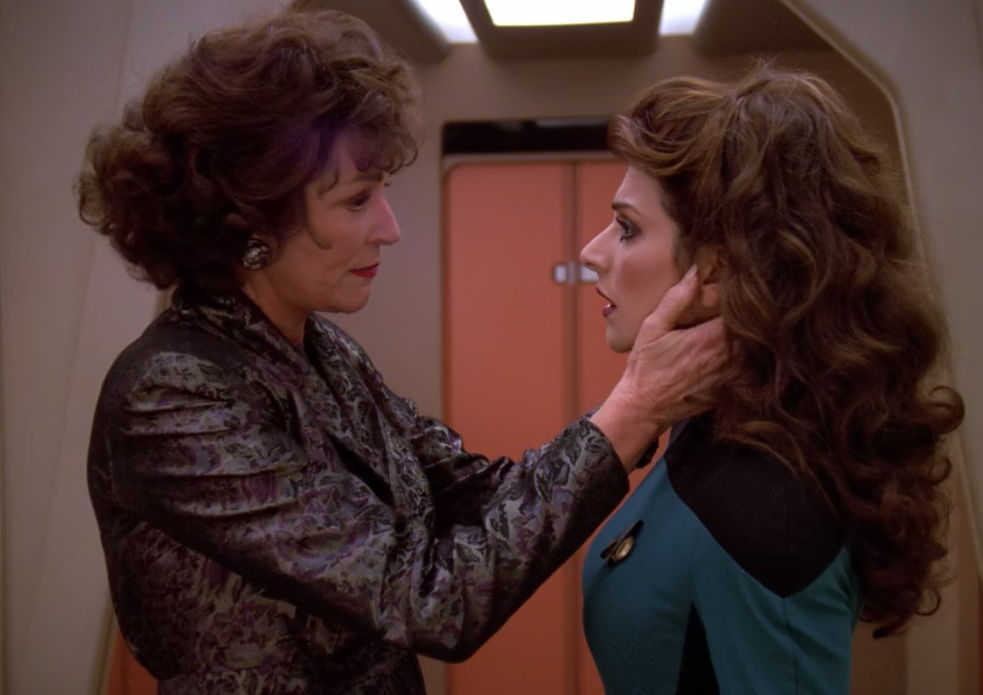
Above from left to right: Lwaxana Troi (Majel Barrett) with onscreen daughter Counselor Troi (Marina Sirtis) on Star Trek: The Next Generation.
Evelyn Reid: But you’re beautiful! This is insane. And insulting. I’d like to see more of you and more women like you onscreen. What can we do to change that?
Marina Sirtis: It’s through YOU, it’s people like you… and I always say this to fans at conventions because it’s true. The fans, the people who turn their TV sets on and go and buy movie tickets have the power. They have the power. They don’t know they have the power though. If they actually—and I’m not saying boycott sci-fi—but if you actually wrote a letter, if you actually wrote to a paper… you know, one person writing in poll terms, one written letter is equivalent to 5,000 people who couldn’t be bothered to write but have the same opinion.
Evelyn Reid: That’s significant.
Marina Sirtis: People have to get involved. You know, people say to me, “when was the last time you went to the movies,” and I say, “I can’t remember” because there’s nothing I particularly want to see. Mind you, I spend a lot of time on airplanes and it would be my idea of total hell if I got on a plane to London and have seen all the [onboard] movies. It’s a seven-hour trip!
Evelyn Reid: [Laughter]
Marina Sirtis: So I do see movies, but just on the plane. But in Europe, it’s [regressing] there too. The ageism is happening there too.
Evelyn Reid: It’s catching on there too?
Marina Sirtis: It’s because of… I think it’s because of reality television.
Evelyn Reid: Reality television? Well that movement has certainly had an impact on production budgets for fiction shows. [Reality shows] are much cheaper to make.
Marina Sirtis: It’s not just that. I think people watch these “normal” people on TV thinking they’re “normal.” But they’re not the norm, otherwise they wouldn’t be on television. In today’s world, real normal people are not on TV. So you get these reality TV shows and everyone looks, you know, incredible and as soon as they have $100 in their pocket, they go and have plastic surgery. This is why I think we’re going backwards. It’s like we’ve erased the progress of the ’60s and the ’70s where women were saying “it’s about what’s in my head, not what size my bra cup is.”
“I’ve worked with actresses and I’m not gonna mention any names, but I’d be looking at them thinking, ‘child, what is wrong with your face?’ I realized that only the mouth is moving. Nothing else is moving. But you know, I’m not going to knock it because these women? They’re made to feel that they’re not good enough.”
Evelyn Reid: …or how taut the skin on my face is.
Marina Sirtis: Exactly. When you have 16-year-old girls being taken to get plastic surgery by their parents, how can you say we’re not going backwards?
Evelyn Reid: And what’s interesting too is the impact of some procedures on the psyche, the human condition. There’s research that’s come out that looks at the impact of botox on empathy. What it’s revealing is a scary, dehumanizing trend: if you can’t move your face when your friend is experiencing distress, if you can’t mimic their facial expressions of emotion the way humans naturally do, you might actually lose the ability to empathize with another, the ability to feel another’s pain, sadness and joy. Compassion? Bye bye.
Marina Sirtis: I haven’t heard that yet but it makes total, total sense. I’ve worked with actresses and I’m not gonna mention any names, but I’d be looking at them thinking, “child, what is wrong with your face?” I realized that only the mouth is moving. Nothing else is moving. But you know, I’m not going to knock it because these women? They’re made to feel that they’re not good enough.
Evelyn Reid: [Sigh]. The pressure.
Marina Sirtis: It’s the pressure. They’re made to feel that they’re not good enough. It’s not a “choice.” Getting botox is not the #1 choice on their bucket list.
Evelyn Reid: They’re afraid they’ll never get work again yet the set is teeming with the bald, the fat, and the older… provided they’re men.
Marina Sirtis: That’s what they worry about. This society is so youth-oriented that God forbid they look old. They’re made to feel scared. Fortunately, I was born with a “I don’t care what you think of me” attitude. I had it as soon as I came out of the womb, much to my parents’ distress.
Evelyn Reid: [Laughter]
Marina Sirtis: I never cared what people thought of me. I know who I am and I know what I can do and I know what I can’t do. And I know what’s important to me. So that’s never been an issue for me, [what people think]. And people think, “oh, that must be because you’re pretty. You were the pretty one on the show.” So it must just be that I got lucky in the genes department. But you know? I was a very ugly child.

Above: Marina Sirtis as Counselor Deanna Troi in Star Trek: Insurrection.
Evelyn Reid: I can relate to that. I was overweight through grade school and high school. I had no “looks” to effortlessly elevate my status. It’s as if it forced me to cultivate my personality, cultivate confidence, build on various skills…
Marina Sirtis: It does! I was ugly, but man, I was popular. I learned very early that you don’t have to be pretty to be popular. You can be funny and be popular. And so I was funny. And I’m still funny and I don’t do that sex bomb thing because that’s not who I am. I’m the funny one. Maybe you’d think that because I had been ugly—and I’m talking scary ugly—that I’d never want to be ugly again [and jump on plastic surgery]. But I don’t see aging as getting ugly. I see aging as just another part of my life.
Evelyn Reid: As do many. Yet we’re not seeing ourselves onscreen. I don’t see life staring back at me. It’s oppressive. It makes me tune out and spend less money on media entertainment. So as you were saying before. Fans have the power. Fans have the power to do something. They… we have the power to change the course of events. Most just don’t seem to realize that. That issue came up when I was talking with Jonathan earlier today. I asked him what would it take to see more TNG, to see Star Trek: The Next Generation on the big screen again. I was telling him that even today, you’re still on my tube, Marina. Every week.
TNG storylines stimulate debate, they encourage reflection on our emotional and cognitive limitations in ways today’s entertainment offerings rarely do. So Jonathan got into the studio politics and how scripts keep being rejected over past experiences with the franchise. But if LeVar Burton can raise millions of dollars in a month for Reading Rainbow with crowdfunding, think of the possibilities. But Jonathan didn’t seem convinced that there is an appetite or desire for more TNG. What would it take to convince the cast, to convince studios that there is an appetite?
Marina Sirtis: It’s the fans. The studio… the five-year plan or ten-year plan for Star Trek, it’s not going away. It makes them too much money. It’s not going away. Right now, they’re focused on the feature films. I think, I mean I don’t know, but I would imagine they feel it would dilute the movies if there was a TV show on at the same time. I don’t know if that’s their thinking or not. If you want TNG back and I’m assuming you want us back in it…
Evelyn Reid: Obviously. Of course.
“I was at a convention once and as a joke, I said, ’50 years of Doctor Who and there’s never been a female doctor? It’s bloody time’.”
Marina Sirtis: …or if you want a reboot of the series… well, that’s a campaign. That’s enough people caring about it to write a letter, to go online, to sign petitions. Look, I was at a convention once and as a joke, I said, “50 years of Doctor Who and there’s never been a female doctor? It’s bloody time. And it should be me.” It should be me. And my fans took it. And ran with it! And there are posters and there are t-shirts and petitions online.
Evelyn Reid: That’s pretty amazing.
Marina Sirtis: I don’t know if anything will happen. But I’m sure at some point the BBC will become aware of it. And even if it isn’t me, maybe the next doctor should be a woman.
Evelyn Reid: It’s about time.
Marina Sirtis: It is time. There’s no reason why it shouldn’t be. They regenerate every time. They don’t have to have a penis.
Evelyn Reid: [Laughter]. So I guess the main takeaway from today’s chat is… wake up people! You can change the course of events.
Marina Sirtis: Exactly. It’s like voting. I know it’s only one vote, but it matters. If you love something, or if you hate something, write a letter!
Evelyn Reid: And the internet has changed that letter into something potentially more viral. We didn’t used to have Indiegogo campaigns even five years ago.
Marina Sirtis: Go on Twitter and do something. That’s what you have to do. Go on Twitter or actually write a letter to someone who will pay attention.
Evelyn Reid: Meanwhile, I can’t be the only one who would like to see more of you, and more of Gates and more of Denise. I’d like to see more of you out there…
Marina Sirtis: But we are! Denise is in two shows right now, Ray Donovan and The Walking Dead. Gates is a director for a theatre company now.
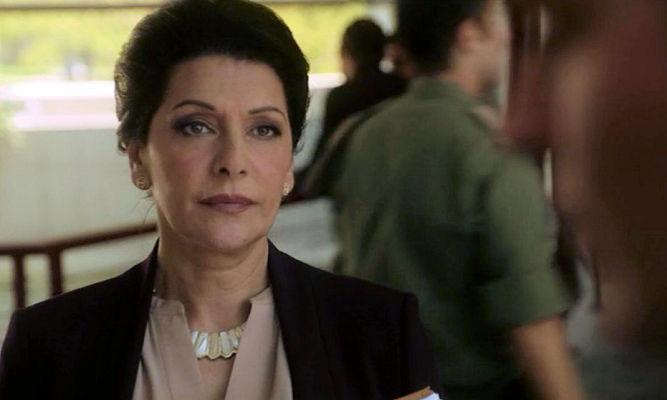
Above: Marina Sirtis as Mossad Director Orli Elbaz on NCIS.
Evelyn Reid: Oh that’s right. She was in Broadway back in the day.
Marina Sirtis: Yeah. She’s working her ass off in theatre. And last season, I became the head of the Mossad on NCIS. I worked on Grey’s Anatomy and a bunch of stuff. The problem is I don’t send out postcards… [laughter].
Evelyn Reid: Before we sign off, you were in Montreal not too long ago, in 2012 with Michael Dorn.
Marina Sirtis: Yes, that’s right.
Evelyn Reid: And you’re no stranger to the city.
Marina Sirtis: Oh, I love Montreal. Just not in the winter.
Evelyn Reid: Join the club. Tell me, is there anything in particular that you love about the city, like places you like returning to or anything along those lines?
Marina Sirtis: You know what I love? I love telling French people in Montreal that they don’t speak French properly.
Evelyn Reid: Ouch!!! [Laughter].
Marina Sirtis: [Laughter].
Evelyn Reid: Man. I was hoping for maybe a restaurant recommendation or something.
Marina Sirtis: Oh that’s going to go down realllllllly well coming from an Englishwoman, isn’t it.
Evelyn Reid: Brutal.
Marina Sirtis: But I can’t remember the name… oh darling, I’m so old now. I can’t remember the names of places anymore. But I do remember that, obviously the eating experience is fantastic in Montreal. Although I do have to say… [laughter]… I will tell you one story about Ethan Phillips (Neelix on Star Trek: Voyager). Him and I were in Montreal one time and he does a really good fake French. Fake French. Absolutely not one word of it is French. But it sounds French, right?
Evelyn Reid: I’m scared to find out where this is going… [Laughter]
Marina Sirtis: So we were in a French restaurant and he was doing this fake French to the waiters. They were not amused.
Evelyn Reid: Yeah… there’s a LOT of sensitivity around that topic here. There’s a lot of concern that French could be lost in the tidal wave of English in North America. In Quebec, there’s a strong sense of valuing the French language and doing everything you can to preserve it. In fact, some believe that the French as spoken in Quebec sounds just like the French of Louis XIV from generations past, some 350 years ago.
Marina Sirtis: That’s probably true. Languages evolve. That could be true but you still don’t talk it like the French talk it and there’s no getting around that. [Laughter].
Evelyn Reid: [Laughter]. It is a unique dialect, I’ll give you that.
Marina Sirtis: Totally different dialect.
Marina Sirtis on Hollywood, Gender Politics, Ageism & the Ultimate Doctor Who
by Evelyn Reid
Originally published on About.com September 9, 2014

Above: Marina Sirtis as Counselor Deanna Troi in Star Trek: Insurrection (image courtesy of Paramount Pictures).
One of the most recognizable faces not only in the world of sci-fi but across ’80s and ’90s syndicated television, Marina Sirtis’ iconic role as Star Trek: The Next Generation Counselor Deanna Troi fueled more than a few passing fantasies. But skin-tight space suits and glorious hair aside, there’s more than meets the eye to Sirtis. Way more. I almost pity the fool who expects the English actress to be the low-key, zen-like embodiment of her on-screen alter ego. Just a few minutes with Sirtis reveals the polar opposite: sparks, fire, buoyant laughter, and a confident, unabashed, in-your-face sense of self.
In an interview I conducted with Sirtis prior to her 2014 Montreal Comiccon appearance along with almost the entire cast of TNG (Wil Wheaton couldn’t make it), she spares no words in her observations of Hollywood’s limitations. For the sake of argument, some may say those limitations may be a contributing factor to Hollywood’s current decline. With all this in mind, Sirtis offers valuable advice to viewers fed up with what they’re seeing on the screen, be it on television or in the movies.

Above: Star Trek: The Next Generation’s Counselor Troi (Marina Sirtis) with Commander Riker (Jonathan Frakes) (photo courtesy of Paramount Pictures).
Evelyn Reid: Hi Marina! I just finished chatting with your imzadi. He says hi and gives his love.
Marina Sirtis: Ohhh, where is Jonathan?
Evelyn Reid: I’m not sure.
Marina Sirtis: He might already be up [in Canada]. He does a lot of directing work in your country.
Evelyn Reid: Does he? Interesting that you brought up his directing because I was just talking about that with him, specifically over what you said. I had quoted you from a 2012 conference. You were saying that in the 36 years of your career, Jonathan Frakes was the best director you had ever worked with.
Marina Sirtis: And it’s true.
Evelyn Reid: How come? What is it about Jonathan’s style that’s so praiseworthy?
Marina Sirtis: Well, directors—and I’m generalizing madly here, you have to understand—directors tend to fall in one of two categories. There are directors that the actors love. And there are directors that the crew loves. The love is for different reasons. The [directors] actors love understand your process, your work, what you’re going through. If they’re an actor themselves, then they have good suggestions to make, they listen… all the things you want from a director as an actor. The directors [crews] love know what they’re doing [on set], [the crew doesn’t] have to work ridiculous hours. Well, the hours are ridiculous anyway but at least you don’t have to work extra ridiculous hours. You’ve got some people who show up to work and they don’t know what they’re going to shoot that day. They kind of wing it. But Jonathan? He has a plan, he has an agenda, he knows which shots he wants, he knows exactly what he wants. [The crew] loves him because he knows what he’s doing.
“It’s very rare that you’ll go onto a film set or a TV set and everyone on the set loves the director. I mean, they would walk on glass for Jonathan. And there’s his personality. He’s a force of nature.”
Evelyn Reid: Right.
Marina Sirtis: It’s very rare that you’ll go onto a film set or a TV set and everyone on the set loves the director. I mean, they would walk on glass for Jonathan. And there’s his personality. He’s a force of nature.
Evelyn Reid: That’s what I’ve heard, that’s he’s almost like the glue that keeps the team together in a way.
Marina Sirtis: No, I’m the glue.
Evelyn Reid: You’re the glue.
Marina Sirtis: I’m the glue. He’s like the energy. He’s like this… I remember the first time I ever met him. He came into the makeup trailer and it was like a hurricane blew in. He really is like this larger-than-life person.
Evelyn Reid: He must have powerful chi. [Laughter].
Marina Sirtis: Oh, he’s wonderful. But as far as keeping everyone together, that would be me. I’m the one who cooks and invites and made sure everyone had lunch on their plates. I was the Mother Hen.
Evelyn Reid: The Mother Hen of the Enterprise. A far cry from the mastermind Troi was supposed to be.
Marina Sirtis: That’s right. I was supposed to be the brains…
Evelyn Reid: …which makes complete sense. I used to wonder as a kid why you didn’t have more authority on the ship. You’re an empath. You can read other people’s emotions. That’s a powerful weapon. Or diplomatic tool. Picard should have been consulting you at every turn the moment a humanoid was involved.

Above from left to right: Lwaxana Troi (Majel Barrett) with onscreen daughter Counselor Troi (Marina Sirtis) on Star Trek: The Next Generation (photo courtesy of Paramount Pictures).
Marina Sirtis: It’s true. She is technically the smartest person in the room. But that didn’t work for a lot of the stories. And I’ve said this a lot and I hate myself for saying it but I think it’s needs to be said because sci-fi fans need to get it into their heads that yes, we’re making shows about the future. But the shows are not written by writers from the future. It’s the writers of today, with all their foibles and ideas and bigotries and histories and baggage. You have to remember that. These shows aren’t being written in the 24th century. The Next Generation was being written in the 20th century. And by men, generally.
Evelyn Reid: Right. In fact, I think there was only one female writer on the team? Or was that with the original Star Trek series?
Marina Sirtis: We had two. Jeri Taylor was a writer/producer on our show for many years. And [while we’re on the topic of writers], Michael Piller wrote me some wonderful stuff. Absolutely did. But this problem doesn’t just [apply] to Star Trek. This is a problem with all sci-fi.
Evelyn Reid: Add all North American television in there, in general, barring rare exceptions. You know, I was just thinking about that whole issue in the context of TNG. Again, even as a kid, it seemed like something was off with the women on the show in the sense of, what happened to Denise Crosby? Where did she go? In the first episodes, she was fascinating but as the show went on, her character seemed to become trivial. And why was Gates McFadden suddenly off the show? And what’s up with the wig when she got back? Her hair was fine before. It seemed like there was this unbalance with regards to the female characters or possibly even treatment on the set. And we haven’t even gotten into Troi’s costumes yet.
Marina Sirtis: Well, Denise quit. It’s as simple as that. Denise wasn’t happy doing a TV series and she quit. But you know, they were really nice because she had a contract. They could have been a-holes and held her to her contract, which has happened in the past in show business. Especially because she was so popular.
Evelyn Reid: She was huge.
Marina Sirtis: She was huge! Her and Data were the two most popular characters by far on the show in the beginning when we first started the show. But Gene [Roddenberry] didn’t want anyone on the show who wasn’t happy. She wanted to leave and he said, “go love. Good luck!” As for Gates, that was a different thing, you’d have to talk to her.
“Something you have to understand about Hollywood and I’m not joking here: Hollywood is all about the hair.”

Above: Marina Sirtis doing hair and makeup screen tests prior to Star Trek: The Next Generation’s 1987 pilot (image courtesy of CBS).
Marina Sirtis: She was let go. But they realized they made a terrible mistake and they brought her back. You know, it’s difficult for women in this business. But we’re talking about the ’80s now, the late ’80s, early ’90s. This was a long time ago. Things have changed a lot since then, thank goodness.
Evelyn Reid: [Sigh]
Marina Sirtis: Something you have to understand about Hollywood and I’m not joking here: Hollywood is all about the hair.
Evelyn Reid: [Laughter]
Marina Sirtis: Hollywood is all about the hair. This is why you never see anyone with a hair out of place on TV. Ever. Like GOD FORBID there should be one hair sticking out. That’s it. I don’t know why they focus on the hair. But they do. In seven years on TNG, the only notes I ever got apart from the “omg you’re brilliant” notes of which I’m like yeah, yeah, I get it… the only time I ever got a note or a phone call was for things like “um, have you changed the color of your lipstick?” Or “did you do something to the front of your hair? It doesn’t look the same.” I mean, literally. This is what they obsess over. How you look.
Evelyn Reid: But do you really see the same thing across the pond?
Marina Sirtis: I always say, in England, it actually goes against you to look good.
Evelyn Reid: Geez.
Marina Sirtis: Actually, in England, the worse you look, the better. I always say that when I come back in my next lifetime, I want to come back fat and Northern and [that way], I will never stop working in [England].
Evelyn Reid: You know, I was watching this film a couple of weeks back. It’s called The Hairdresser. It’s German and I think it came out in 2010. Its star character is, first of all, a woman, she’s obese, she’s middle-aged, she can still move her face so it’s obvious she doesn’t have much botox, and GASP, she has a sex life. An explicit one. And guess what? The film was great!
Marina Sirtis: The film was brilliant, right?
Evelyn Reid: It was wonderful. But you just don’t see that here in North America, in Hollywood or even in general. So on the one hand, as you said before, a lot has changed since the ’80s but on the other hand, there’s the argument that we may actually be regressing in terms of how we portray women on the big screen and on the small screen.
Marina Sirtis: I do. I am one of those people who thinks we’re regressing.
Evelyn Reid: And as a woman myself, I already felt disenfranchised by Hollywood by the time I hit age 25 because it seemed as though television and movies were telling me that my life was over, that my best years were gone. I’m done. I’m over. I’m a walking, breathing decline from there.
Marina Sirtis: Well honey, you try being my age.

Above from left to right: Star Trek: The Next Generation cast members Marina Sirtis, Denis Crosby, and Gates McFadden.
Evelyn Reid: But you’re beautiful! This is insane. And insulting. I’d like to see more of you and more women like you onscreen. What can we do to change that?
Marina Sirtis: It’s through YOU, it’s people like you… and I always say this to fans at conventions because it’s true. The fans, the people who turn their TV sets on and go and buy movie tickets have the power. They have the power. They don’t know they have the power though. If they actually—and I’m not saying boycott sci-fi—but if you actually wrote a letter, if you actually wrote to a paper… you know, one person writing in poll terms, one written letter is equivalent to 5,000 people who couldn’t be bothered to write but have the same opinion.
Evelyn Reid: That’s significant.
Marina Sirtis: People have to get involved. You know, people say to me, “when was the last time you went to the movies,” and I say, “I can’t remember” because there’s nothing I particularly want to see. Mind you, I spend a lot of time on airplanes and it would be my idea of total hell if I got on a plane to London and have seen all the [onboard] movies. It’s a seven-hour trip!
Evelyn Reid: [Laughter]
Marina Sirtis: So I do see movies, but just on the plane. But in Europe, it’s [regressing] there too. The ageism is happening there too.
Evelyn Reid: It’s catching on there too?
Marina Sirtis: It’s because of… I think it’s because of reality television.
Evelyn Reid: Reality television? Well that movement has certainly had an impact on production budgets for fiction shows. [Reality shows] are much cheaper to make.
Marina Sirtis: It’s not just that. I think people watch these “normal” people on TV thinking they’re “normal.” But they’re not the norm, otherwise they wouldn’t be on television. In today’s world, real normal people are not on TV. So you get these reality TV shows and everyone looks, you know, incredible and as soon as they have $100 in their pocket, they go and have plastic surgery. This is why I think we’re going backwards. It’s like we’ve erased the progress of the ’60s and the ’70s where women were saying “it’s about what’s in my head, not what size my bra cup is.”

Above: Marina Sirtis at the 2016 edition of Lucca Comics & Games (photo by Flickr user Niccolò Caranti (CC BY-SA 4.0)).
“I’ve worked with actresses and I’m not gonna mention any names, but I’d be looking at them thinking, ‘child, what is wrong with your face?’ I realized that only the mouth is moving. Nothing else is moving. But you know, I’m not going to knock it because these women? They’re made to feel that they’re not good enough.”
Evelyn Reid: …or how taut the skin on my face is.
Marina Sirtis: Exactly. When you have 16-year-old girls being taken to get plastic surgery by their parents, how can you say we’re not going backwards?
Evelyn Reid: And what’s interesting too is the impact of some procedures on the psyche, the human condition. There’s research that’s come out that looks at the impact of botox on empathy. What it’s revealing is a scary, dehumanizing trend: if you can’t move your face when your friend is experiencing distress, if you can’t mimic their facial expressions of emotion the way humans naturally do, you might actually lose the ability to empathize with another, the ability to feel another’s pain, sadness and joy. Compassion? Bye bye.
Marina Sirtis: I haven’t heard that yet but it makes total, total sense. I’ve worked with actresses and I’m not gonna mention any names, but I’d be looking at them thinking, “child, what is wrong with your face?” I realized that only the mouth is moving. Nothing else is moving. But you know, I’m not going to knock it because these women? They’re made to feel that they’re not good enough.
Evelyn Reid: [Sigh]. The pressure.
Marina Sirtis: It’s the pressure. They’re made to feel that they’re not good enough. It’s not a “choice.” Getting botox is not the #1 choice on their bucket list.
Evelyn Reid: They’re afraid they’ll never get work again yet the set is teeming with the bald, the fat, and the older… provided they’re men.
Marina Sirtis: That’s what they worry about. This society is so youth-oriented that God forbid they look old. They’re made to feel scared. Fortunately, I was born with a “I don’t care what you think of me” attitude. I had it as soon as I came out of the womb, much to my parents’ distress.
Evelyn Reid: [Laughter]
Marina Sirtis: I never cared what people thought of me. I know who I am and I know what I can do and I know what I can’t do. And I know what’s important to me. So that’s never been an issue for me, [what people think]. And people think, “oh, that must be because you’re pretty. You were the pretty one on the show.” So it must just be that I got lucky in the genes department. But you know? I was a very ugly child.
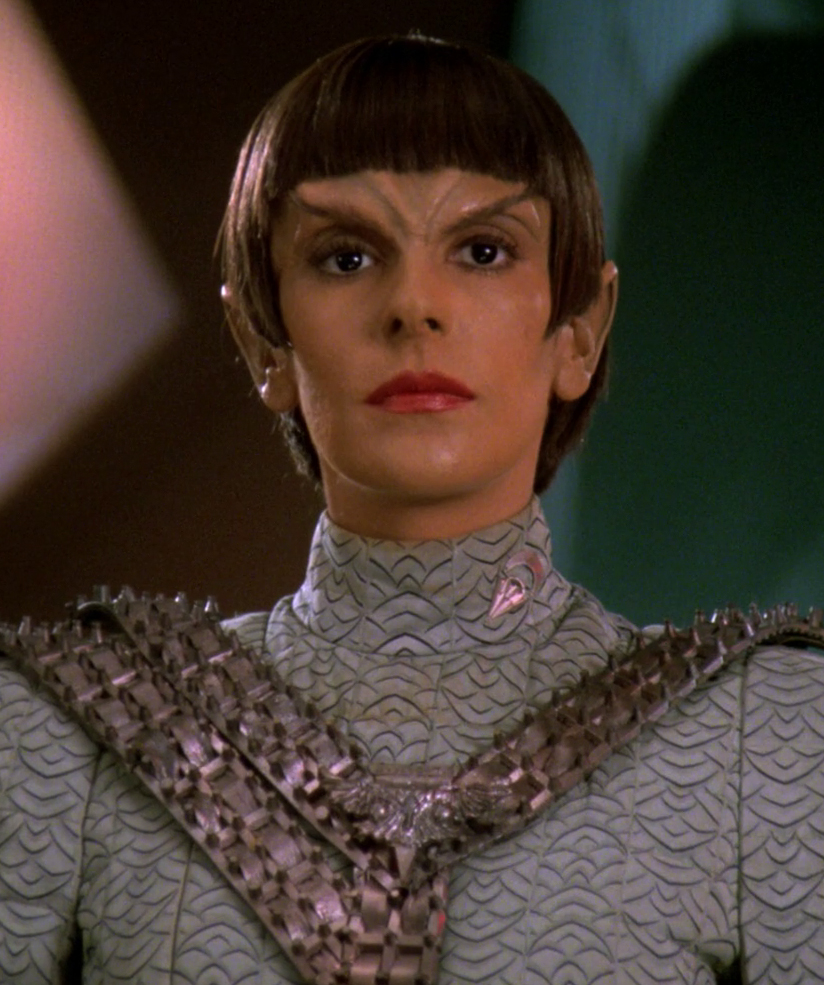
Above: Marina Sirtis as Counselor Deanna Troi impersonating a Romulan sub-commander in Face of the Enemy, a Season 6 Star Trek: The Next Generation episode (image courtesy of CBS).
Evelyn Reid: I can relate to that. I was overweight through grade school and high school. I had no “looks” to effortlessly elevate my status. It’s as if it forced me to cultivate my personality, cultivate confidence, build on various skills…
Marina Sirtis: It does! I was ugly, but man, I was popular. I learned very early that you don’t have to be pretty to be popular. You can be funny and be popular. And so I was funny. And I’m still funny and I don’t do that sex bomb thing because that’s not who I am. I’m the funny one. Maybe you’d think that because I had been ugly—and I’m talking scary ugly—that I’d never want to be ugly again [and jump on plastic surgery]. But I don’t see aging as getting ugly. I see aging as just another part of my life.
Evelyn Reid: As do many. Yet we’re not seeing ourselves onscreen. I don’t see life staring back at me. It’s oppressive. It makes me tune out and spend less money on media entertainment. So as you were saying before. Fans have the power. Fans have the power to do something. They… we have the power to change the course of events. Most just don’t seem to realize that. That issue came up when I was talking with Jonathan earlier today. I asked him what would it take to see more TNG, to see Star Trek: The Next Generation on the big screen again. I was telling him that even today, you’re still on my tube, Marina. Every week.
TNG storylines stimulate debate, they encourage reflection on our emotional and cognitive limitations in ways today’s entertainment offerings rarely do. So Jonathan got into the studio politics and how scripts keep being rejected over past experiences with the franchise. But if LeVar Burton can raise millions of dollars in a month for Reading Rainbow with crowdfunding, think of the possibilities. But Jonathan didn’t seem convinced that there is an appetite or desire for more TNG. What would it take to convince the cast, to convince studios that there is an appetite?
Marina Sirtis: It’s the fans. The studio… the five-year plan or ten-year plan for Star Trek, it’s not going away. It makes them too much money. It’s not going away. Right now, they’re focused on the feature films. I think, I mean I don’t know, but I would imagine they feel it would dilute the movies if there was a TV show on at the same time. I don’t know if that’s their thinking or not. If you want TNG back and I’m assuming you want us back in it…
Evelyn Reid: Obviously. Of course.
“I was at a convention once and as a joke, I said, “50 years of Doctor Who and there’s never been a female doctor? It’s bloody time.””
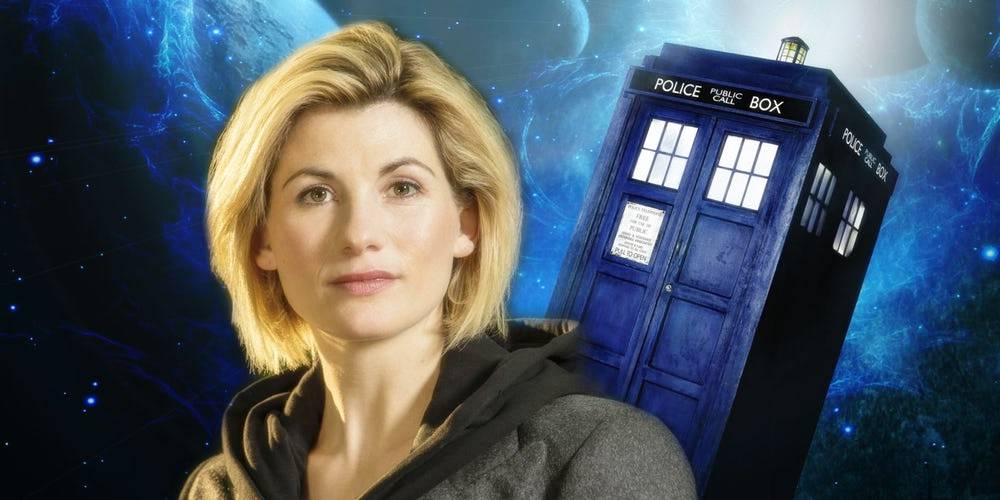
Above: Jodie Whittaker, the actress announced in late 2017 to be cast as the first female Doctor Who (image courtesy of the BBC).
Evelyn Reid: That’s pretty amazing.
Marina Sirtis: I don’t know if anything will happen. But I’m sure at some point the BBC will become aware of it. And even if it isn’t me, maybe the next doctor should be a woman.
Evelyn Reid: It’s about time.
Marina Sirtis: It is time. There’s no reason why it shouldn’t be. They regenerate every time. They don’t have to have a penis.
Evelyn Reid: (belly laugh) So I guess the main takeaway from today’s chat is… wake up people! You can change the course of events.
Marina Sirtis: Exactly. It’s like voting. I know it’s only one vote, but it matters. If you love something, or if you hate something, write a letter!
Evelyn Reid: And the internet has changed that letter into something potentially more viral. We didn’t used to have Indiegogo campaigns even five years.
Marina Sirtis: Go on Twitter and do something. That’s what you have to do. Go on Twitter or actually write a letter to someone who will pay attention.
Evelyn Reid: Meanwhile, I can’t be the only one who would like to see more of you, and more of Gates and more of Denise. I’d like to see more of you out there…
Marina Sirtis: But we are! Denise is in two shows right now, Ray Donovan and The Walking Dead. Gates is a director for a theatre company now.

Above: Marina Sirtis as Mossad Director Orli Elbaz on NCIS.
Evelyn Reid: Oh that’s right. She was in Broadway back in the day.
Marina Sirtis: Yeah. She’s working her ass off in theatre. And last season, I became the head of the Mossad on NCIS. I worked on Grey’s Anatomy and a bunch of stuff. The problem is I don’t send out postcards… [laughter].
Evelyn Reid: Before we sign off, you were in Montreal not too long ago, in 2012 with Michael Dorn.
Marina Sirtis: Yes, that’s right.
Evelyn Reid: And you’re no stranger to the city.
Marina Sirtis: Oh, I love Montreal. Just not in the winter.
Evelyn Reid: Join the club. Tell me, is there anything in particular that you love about the city, like places you like returning to or anything along those lines?
Marina Sirtis: You know what I love? I love telling French people in Montreal that they don’t speak French properly.
Evelyn Reid: Ouch!!! [Laughter].
Marina Sirtis: [Laughter].
Evelyn Reid: Man. I was hoping for maybe a restaurant recommendation or something.
Marina Sirtis: Oh that’s going to go down realllllllly well coming from an Englishwoman, isn’t it.
Evelyn Reid: Brutal.
Marina Sirtis: But I can’t remember the name… oh darling, I’m so old now. I can’t remember the names of places anymore. But I do remember that, obviously the eating experience is fantastic in Montreal. Although I do have to say… [laughter]… I will tell you one story about Ethan Phillips (Neelix on Star Trek: Voyager). Him and I were in Montreal one time and he does a really good fake French. Fake French. Absolutely not one word of it is French. But it sounds French, right?
Evelyn Reid: I’m scared to find out where this is going… [Laughter]
Marina Sirtis: So we were in a French restaurant and he was doing this fake French to the waiters. They were not amused.
Evelyn Reid: Yeah… there’s a LOT of sensitivity around that topic here. There’s a lot of concern that French could be lost in the tidal wave of English in North America. In Quebec, there’s a strong sense of valuing the French language and doing everything you can to preserve it. In fact, some believe that the French as spoken in Quebec sounds just like the French of Louis XIV from generations past, some 350 years ago.
Marina Sirtis: That’s probably true. Languages evolve. That could be true but you still don’t talk it like the French talk it and there’s no getting around that. [Laughter].
Evelyn Reid: [Laughter]. It is a unique dialect, I’ll give you that.
Marina Sirtis: Totally different dialect.
